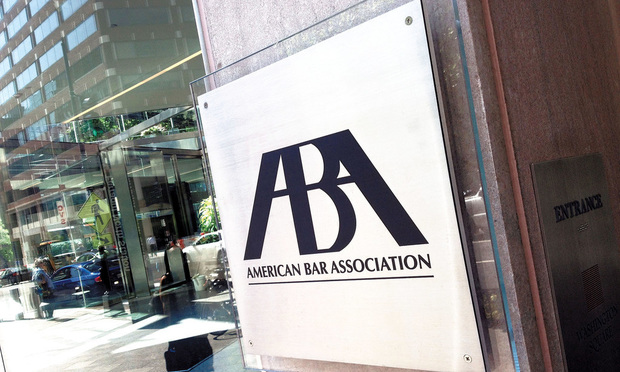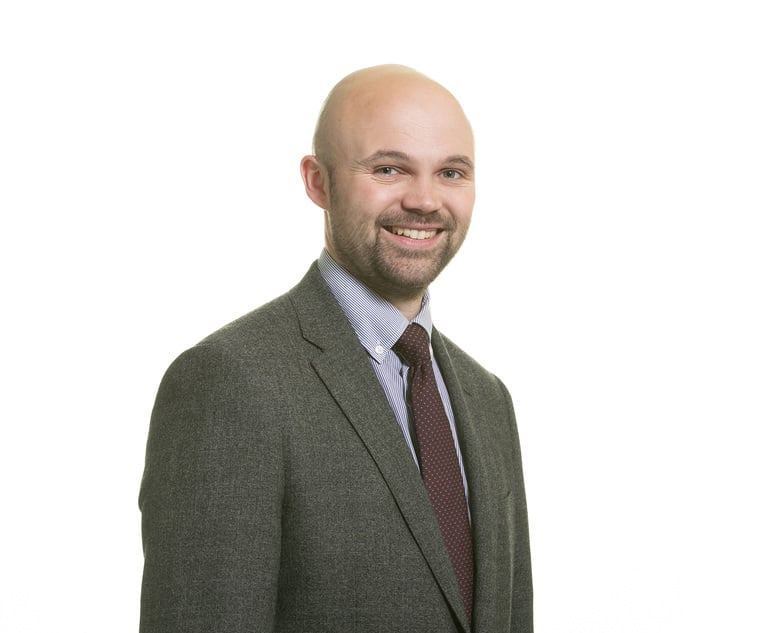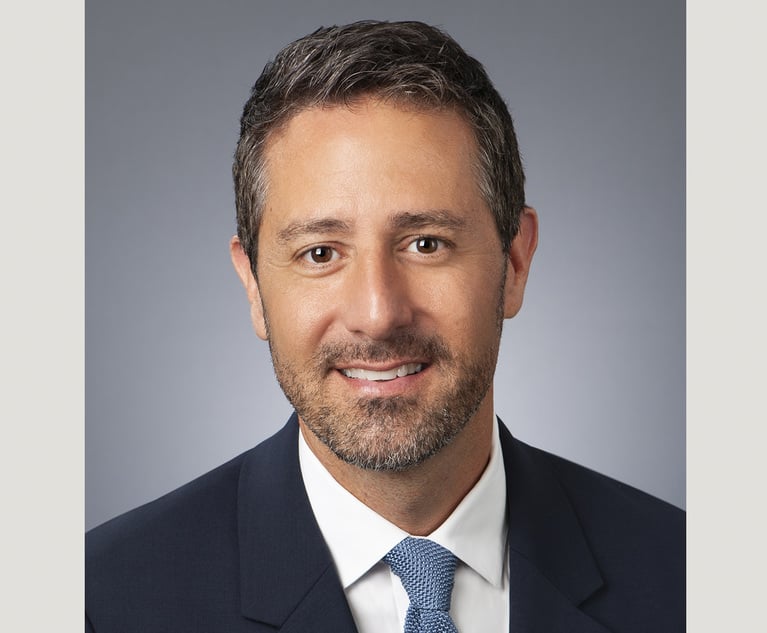Firms Have No Claim to 'Unfinished Business,' ABA Tells DC Court
Pointing to ethics rules, the country's largest bar group said dissolved law firms should not be able to claim a property stake in unfinished client matters that travel with a partner to a new firm.
July 16, 2018 at 03:37 PM
4 minute read
 Photo: Diego M. Radzinschi/ALM
Photo: Diego M. Radzinschi/ALM
The American Bar Association has urged an appeals court in Washington, D.C., to rule against Howrey's bankruptcy estate and prevent dissolved law firms from claiming a portion of fees from hourly matters that partners bring with them to a new firm.
In an amicus brief filed late Thursday, the ABA, represented by Reed Smith and Orrick, Herrington & Sutcliffe, weighed in on the so-called unfinished business doctrine, the idea that a defunct law firm's bills for ongoing matters qualify as assets for the bankrupt firm. The ABA wrote that client matters should be considered the property of the clients themselves and that a ruling otherwise would run counter to legal ethics rules and the reality of running a modern-day law practice.
The bar association's amicus brief, in the District of Columbia Court of Appeals, comes after the California Supreme Court ruled in March on the unfinished business doctrine in litigation involving the estate of another bankrupt law firm, Heller Ehrman. The California ruling was prompted by the U.S. Court of Appeals for the Ninth Circuit, which asked the state high court to consider the unfinished business doctrine in the Heller case. The Ninth Circuit also certified related questions to the D.C. appeals court in the Howrey case because that firm's partnership was subject to D.C. law.
In California, the state high court came down against the Heller bankruptcy trustee, finding that dissolved firms are not entitled to a portion of unfinished hourly fee matters that departing partners take with them.
The ABA's amicus brief, which comes as the D.C. Circuit considers the Ninth Circuit's questions, argues for a similar approach in the Howrey case. The bar group said a position taken by the Howrey bankruptcy trustee Allan Diamond of Diamond McCarthy is “flatly inconsistent with the ethical rules that apply in this case.”
Diamond, represented by a team from his own firm led by partner Christopher Sullivan, has argued that the bankruptcy estates have a property interest in clients' matters that were pending at the time of a law firm's dissolution. But the ABA disagrees with that notion, saying that law firms don't own the matters and, instead, clients are the ones who maintain ownership and can hire or fire a lawyer at any time.
“The importance of client choice underpins multiple black-letter ethical rules, including the rules protecting a client's right to terminate her lawyer, the rules limiting the use of restrictive covenants, and the rules specifying the permissible methods of fee splitting,” the ABA wrote. “Any rule that would entitle a terminated law firm—much less the estate of a defunct law firm—to claim a property interest over the fees earned by another law firm, after a former client fired the old firm and hired the new one, cannot be reconciled with these ethical requirements.”
Sullivan, who represents the Howrey trustee and also represented the bankruptcy trustee in the Heller case, was not immediately available for comment.
As The American Lawyer reported earlier this year, questions about the unfinished business doctrine may partially explain why fewer law firms have entered official bankruptcies in recent years.
In addition to the closely watched California case involving Heller's bankruptcy estate, the New York Court of Appeals had previously ruled that firms don't have ownership of client matters, and that lawyers are entitled only to fees they earn from working on a specific matter. The New York case arose out of the bankruptcies of Thelen and Coudert Brothers.
With courts continuing to line up against the doctrine, bankruptcy trustees will likely have fewer assets to try to recover in clawback litigation, one lawyer with experience in law firm insolvencies told The American Lawyer in January. That, in turn, could help make the entire bankruptcy process a less appealing approach to dissolving a law firm.
Correction: A previous version of this article misidentified the court in which the ABA filed its brief. It is the District of Columbia Court of Appeals, not a federal appeals court. We regret the error.
This content has been archived. It is available through our partners, LexisNexis® and Bloomberg Law.
To view this content, please continue to their sites.
Not a Lexis Subscriber?
Subscribe Now
Not a Bloomberg Law Subscriber?
Subscribe Now
NOT FOR REPRINT
© 2025 ALM Global, LLC, All Rights Reserved. Request academic re-use from www.copyright.com. All other uses, submit a request to [email protected]. For more information visit Asset & Logo Licensing.
You Might Like
View All

Holland & Knight Hires Former Davis Wright Tremaine Managing Partner in Seattle
3 minute read
Am Law 200 Firms Announce Wave of D.C. Hires in White-Collar, Antitrust, Litigation Practices
3 minute read
Paul Hastings Hires Music Industry Practice Chair From Willkie in Los Angeles
Trending Stories
- 1‘Ripe for SCOTUS’: Ruling Creates Circuit Split on NLRB’s Expanded Monetary Remedies
- 2'They Are Never Going to Learn': Geico Not Protected by Litigation Privilege
- 3Supreme Court Takes Up Case Over Approval of Religious Charter School
- 4Gifts of Interest in Charitable LLCs
- 5Workers' Attempt to Link H-1B Hiring to Tax Fraud Falls Short With 2nd Circuit
Who Got The Work
J. Brugh Lower of Gibbons has entered an appearance for industrial equipment supplier Devco Corporation in a pending trademark infringement lawsuit. The suit, accusing the defendant of selling knock-off Graco products, was filed Dec. 18 in New Jersey District Court by Rivkin Radler on behalf of Graco Inc. and Graco Minnesota. The case, assigned to U.S. District Judge Zahid N. Quraishi, is 3:24-cv-11294, Graco Inc. et al v. Devco Corporation.
Who Got The Work
Rebecca Maller-Stein and Kent A. Yalowitz of Arnold & Porter Kaye Scholer have entered their appearances for Hanaco Venture Capital and its executives, Lior Prosor and David Frankel, in a pending securities lawsuit. The action, filed on Dec. 24 in New York Southern District Court by Zell, Aron & Co. on behalf of Goldeneye Advisors, accuses the defendants of negligently and fraudulently managing the plaintiff's $1 million investment. The case, assigned to U.S. District Judge Vernon S. Broderick, is 1:24-cv-09918, Goldeneye Advisors, LLC v. Hanaco Venture Capital, Ltd. et al.
Who Got The Work
Attorneys from A&O Shearman has stepped in as defense counsel for Toronto-Dominion Bank and other defendants in a pending securities class action. The suit, filed Dec. 11 in New York Southern District Court by Bleichmar Fonti & Auld, accuses the defendants of concealing the bank's 'pervasive' deficiencies in regards to its compliance with the Bank Secrecy Act and the quality of its anti-money laundering controls. The case, assigned to U.S. District Judge Arun Subramanian, is 1:24-cv-09445, Gonzalez v. The Toronto-Dominion Bank et al.
Who Got The Work
Crown Castle International, a Pennsylvania company providing shared communications infrastructure, has turned to Luke D. Wolf of Gordon Rees Scully Mansukhani to fend off a pending breach-of-contract lawsuit. The court action, filed Nov. 25 in Michigan Eastern District Court by Hooper Hathaway PC on behalf of The Town Residences LLC, accuses Crown Castle of failing to transfer approximately $30,000 in utility payments from T-Mobile in breach of a roof-top lease and assignment agreement. The case, assigned to U.S. District Judge Susan K. Declercq, is 2:24-cv-13131, The Town Residences LLC v. T-Mobile US, Inc. et al.
Who Got The Work
Wilfred P. Coronato and Daniel M. Schwartz of McCarter & English have stepped in as defense counsel to Electrolux Home Products Inc. in a pending product liability lawsuit. The court action, filed Nov. 26 in New York Eastern District Court by Poulos Lopiccolo PC and Nagel Rice LLP on behalf of David Stern, alleges that the defendant's refrigerators’ drawers and shelving repeatedly break and fall apart within months after purchase. The case, assigned to U.S. District Judge Joan M. Azrack, is 2:24-cv-08204, Stern v. Electrolux Home Products, Inc.
Featured Firms
Law Offices of Gary Martin Hays & Associates, P.C.
(470) 294-1674
Law Offices of Mark E. Salomone
(857) 444-6468
Smith & Hassler
(713) 739-1250










